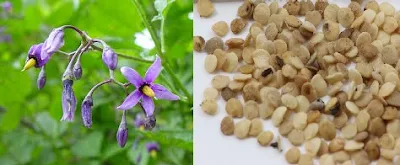 |
| Solanum dulcamara in Kashmir |
Solanum dulcamara, commonly known as bittersweet nightshade or woody nightshade, is a plant that has been historically used in traditional medicine for various purposes. Here are some of the potential benefits associated with this plant:
Traditional Medicine: In folk medicine, Solanum dulcamara has been used to treat a variety of ailments such as rheumatism, arthritis, and skin conditions like eczema and psoriasis. It has been used both internally and externally for these purposes.
Anti-inflammatory Properties: Some studies suggest that extracts from Solanum dulcamara may have anti-inflammatory effects, which could potentially help in reducing inflammation associated with conditions like arthritis.
Antioxidant Activity: Like many plants, Solanum dulcamara contains compounds with antioxidant properties. Antioxidants help neutralize free radicals in the body, which are harmful molecules that can contribute to various chronic diseases.
Pain Relief : Due to its traditional use for rheumatic conditions, Solanum dulcamara is believed to have pain-relieving properties, although more research is needed to confirm its effectiveness and safety for this purpose.
Diuretic Effects: In some cultures, Solanum dulcamara has been used as a diuretic to help increase urine production, which may be beneficial in certain medical conditions.
Wound Healing: The plant has also been applied topically to wounds and skin irritations to promote healing and relieve itching.
Availability: Plant/Seeds
WhatsApp/Telegram; 9858986794
Mob: 09858986794
Ph: 01933-223705
e-mail: jkmpic@gmail.com


